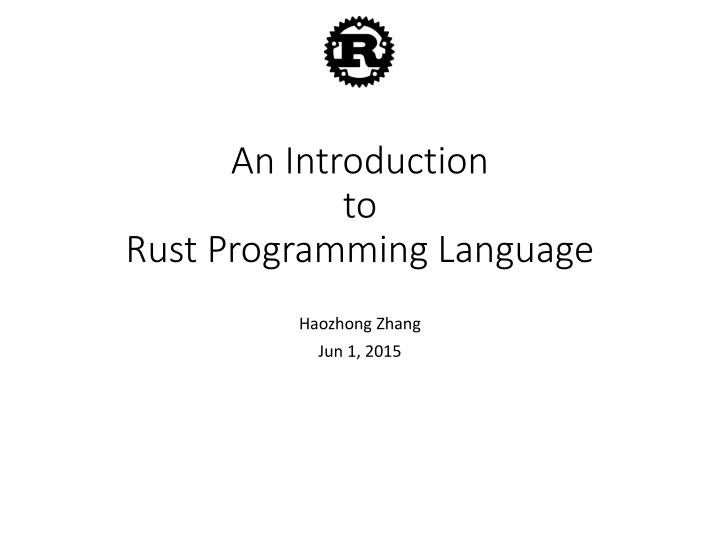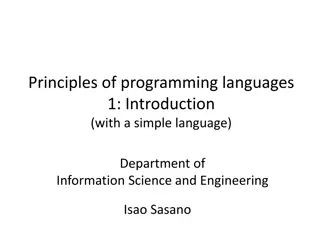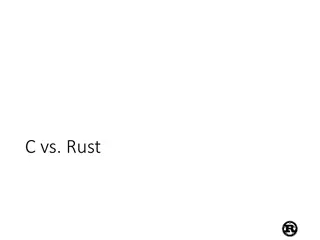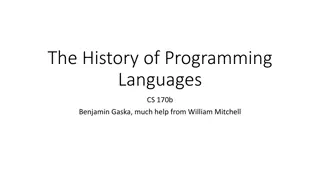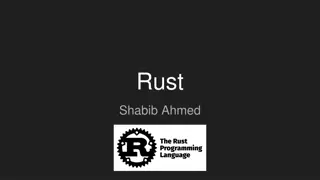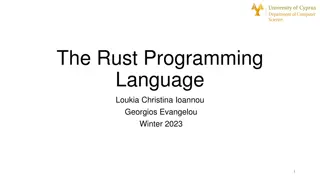An Introduction to Rust Programming Language Overview
Rust is a powerful systems programming language known for blazing speed, memory safety, and thread security. This overview covers its history, key features, real-world applications, and comparisons with other languages like C/C++ and Haskell.
Download Presentation

Please find below an Image/Link to download the presentation.
The content on the website is provided AS IS for your information and personal use only. It may not be sold, licensed, or shared on other websites without obtaining consent from the author.If you encounter any issues during the download, it is possible that the publisher has removed the file from their server.
You are allowed to download the files provided on this website for personal or commercial use, subject to the condition that they are used lawfully. All files are the property of their respective owners.
The content on the website is provided AS IS for your information and personal use only. It may not be sold, licensed, or shared on other websites without obtaining consent from the author.
E N D
Presentation Transcript
An Introduction to Rust Programming Language Haozhong Zhang Jun 1, 2015
Acknowledgment Parts of contents in the following slides may use contents from following sources. Aaron Turon, The Rust Programming Language, Colloquium on Computer Systems Seminar Series (EE380) , Stanford University, 2015. Alex Crichton, Intro to the Rust programming language, http://people.mozilla.org/~acrichton/rust-talk- 2014-12-10/ The Rust Programming Language, https://doc.rust- lang.org/stable/book/
What is Rust? From the official website (http://rust-lang.org): Rust is a systems programming language that runs blazingly fast, prevents nearly all segfaults, and guarantees thread safety.
A brief history Pre-2009 Graydone Hoare terrible memory leakages/bugs in Firefox 2009 Experimental web browser layout engine: Servo Mozilla Corp. 2013 Samsung Corp. Joined 2015/05/15 v1.0 Stable Released!
Who are using Rust? rustc: Rust compiler https://github.com/rust-lang/rust Cargo: Rust s package manager https://github.com/rust-lang/cargo Servo: Experimental web browser layout engine https://github.com/servo/servo Piston: A user friendly game engine https://github.com/PistonDevelopers/piston Iron: An extensible, concurrent web framework https://github.com/iron/iron
Control & Safety Things make Rust Rust.
In the real world Rust is the coating closest to the bare metal.
As a programming language fn main() { println!( Hello, world! ); } Rust is a system programming language barely on the hardware. No runtime requirement (eg. GC/Dynamic Type/ ) More control (over memory allocation/destruction/ )
More than that Haskell/Python C/C++ more control, less safety less control, more safety Rust more control, more safety
What is control? typedef struct Dummy { int a; int b; } Dummy; Precise memory layout void foo(void) { Dummy *ptr = (Dummy *) malloc(sizeof(struct Dummy)); ptr->a = 2048; free(ptr); } Lightweight reference Deterministic destruction .a = 2048 .a ptr .b Stack Heap
Rusts Solution: Zero-cost Abstraction struct Dummy { a: i32, b: i32 } Memory allocation fn foo() { let mut res: Box<Dummy> = Box::new(Dummy { a: 0, b: 0 }); res.a = 2048; } Resource owned by res is freed automatically Variable binding .a = 0 .a = 2048 res .b = 0 Stack Heap
Side Slide: Type Inference struct Dummy { a: i32, b: i32 } fn foo() { let mut res: Box<Dummy> = Box::new(Dummy { a: 0, b: 0 }); res.a = 2048; }
What is safety? typedef struct Dummy { int a; int b; } Dummy; void foo(void) { Dummy *ptr = (Dummy *) malloc(sizeof(struct Dummy)); Dummy *alias = ptr; free(ptr); int a = alias.a; free(alias); } Use after free Aliasing Mutation Double free Dangling Pointer .a ptr .b alias Stack Heap
Rusts Solution: Ownership & Borrowing Aliasing Mutation Compiler enforces: Every resource has a unique owner. Others can borrow the resource from its owner. Owner cannot free or mutate its resource while it is borrowed. No need for runtime Memory safety Data-race freedom
Ownership struct Dummy { a: i32, b: i32 } fn foo() { let mut res = Box::new(Dummy { a: 0, b: 0 }); } res is out of scope and its resource is freed automatically owns .a = 0 res .b = 0 Stack Heap
Ownership: Lifetime struct Dummy { a: i32, b: i32 } fn foo() { let mut res: Box<Dummy>; { res = Box::new(Dummy {a: 0, b: 0}); } res.a = 2048; } Lifetime that res owns the resource. Compiling Error: res no longer owns the resource Lifetime is determined and checked statically.
Ownership: Unique Owner Aliasing Mutation struct Dummy { a: i32, b: i32 } fn foo() { let mut res = Box::new(Dummy { a: 0, b: 0 }); take(res); println!( res.a = {} , res.a); } Ownership is moved from res to arg Compiling Error! fn take(arg: Box<Dummy>) { } arg is out of scope and the resource is freed automatically
Immutable/Shared Borrowing (&) Aliasing Mutation struct Dummy { a: i32, b: i32 } fn foo() { let mut res = Box::new(Dummy{ a: 0, b: 0 }); take(&res); res.a = 2048; } Resource is returned from arg to res Resource is immutably borrowed by arg from res fn take(arg: &Box<Dummy>) { arg.a = 2048; } Resource is still owned by res. No free here. Compiling Error: Cannot mutate via an immutable reference
Immutable/Shared Borrowing (&) struct Dummy { a: i32, b: i32 } fn foo() { let mut res = Box::new(Dummy{a: 0, b: 0}); { let alias1 = &res; let alias2 = &res; let alias3 = alias2; res.a = 2048; } res.a = 2048; } Read-only sharing
Mutable Borrowing (&mut) Aliasing Mutation struct Dummy { a: i32, b: i32 } fn foo() { let mut res = Box::new(Dummy{a: 0, b: 0}); take(&mut res); res.a = 4096; Mutably borrowed by arg from res Multiple mutable borrowings are disallowed let borrower = &mut res; let alias = &mut res; } Returned from arg to res fn take(arg: &mut Box<Dummy>) { arg.a = 2048; }
Side Slide: Mutability Every resource in Rust is immutable by default. mut is used to declare a resource as mutable. struct Dummy { a: i32, b: i32 } fn foo() { let res = Box::new(Dummy{a: 0, b: 0}); Error: Resource is immutable res.a = 2048; let borrower = &mut res; } Error: Cannot get a mutable borrowing of an immutable resource
Concurrency & Data-race Freedom struct Dummy { a: i32, b: i32 } fn foo() { let mut res = Box::new(Dummy {a: 0, b: 0}); Spawn a new thread std::thread::spawn(move || { let borrower = &mut res; borrower.a += 1; }); res is mutably borrowed Error: res is being mutably borrowed res.a += 1; }
Unsafe Life is hard.
Mutably Sharing Mutably sharing is inevitable in the real world. Example: mutable doubly linked list prev prev prev next next next struct Node { prev: option<Box<Node>>, next: option<Box<Node>> }
Rusts Solution: Raw Pointers prev prev prev next next next struct Node { prev: option<Box<Node>>, next: *mut Node } Raw pointer Compiler does NOT check the memory safety of most operations wrt. raw pointers. Most operations wrt. raw pointers should be encapsulated in a unsafe {} syntactic structure.
Rusts Solution: Raw Pointers let a = 3; unsafe { let b = &a as *const u32 as *mut u32; *b = 4; } I know what I m doing println!( a = {} , a); Print a = 4
Foreign Function Interface (FFI) All foreign functions are unsafe. extern { fn write(fd: i32, data: *const u8, len: u32) -> i32; } fn main() { let msg = b Hello, world!\n ; unsafe { write(1, &msg[0], msg.len()); } }
Inline Assembly #![feature(asm)] fn outl(port: u16, data: u32) { unsafe { asm!( outl %0, %1 : : a (data), d (port) : : volatile ); } }
Other Goodies Enums, Pattern Match, Generic, Traits, Tests,
Enums First-class Instead of integers (C/C++) Structural Parameters Replacement of union in C/C++
Enums enum RetInt { Fail(u32), Succ(u32) } fn foo_may_fail(arg: u32) -> RetInt { let fail = false; let errno: u32; let result: u32; ... if fail { RetInt::Fail(errno) } else { RetInt::Succ(result) } }
Enums: No Null Pointers enum std::option::Option<T> { None, Some(T) } struct SLStack { top: Option<Box<Slot>> } struct Slot { data: Box<u32>, prev: Option<Box<Slot>> }
Pattern Match let x = 5; match x { 1 => println!( one ), 2 => println!( two ), 3|4 => println!( three or four ), 5 ... 10 => println!( five to ten ), e @ 11 ... 20 => println!( {} , e); _ => println!( others ), } Compiler enforces the matching is complete
Pattern Match let x = Dummy{ a: 2048, b: 4096 }; match x { Dummy{ a: va, b: vb } => va + vb, } match x { Dummy{ a: va, .. } => println!( a={} , va), }
Pattern Match enum RetInt { Fail(u32), Succ(u32) } fn foo_may_fail(arg: u32) -> RetInt { ... } fn main() { match foo_may_fail(2048) { Fail(errno) => println!( Failed w/ err={} , errno), Succ(result) => println!( Result={} , result), } }
Pattern Match enum std::option::Option<T> { None, Some(T) } struct SLStack { top: Option<Box<Slot>> } fn is_empty(stk: &SLStack) -> bool { match stk.top { None => true, Some(..) => false, } }
Generic struct SLStack { top: Option<Box<Slot>> } } struct SLStack<T> { top: Option<Box<Slot<T>>> struct Slot { data: Box<u32>, prev: Option<Box<Slot>> } } struct Slot<T> { data: Box<T>, prev: Option<Box<Slot<T>>> fn is_empty(stk: &SLStack) -> bool { match stk.top { None => true, Some(..) => false, } } } fn is_empty<T>(stk: &SLStack<T>) -> bool { match stk.top { None => true, Some(..) => false, }
Traits More generic Typeclass in Haskell
Type implemented this trait Traits Object of the type implementing this trait trait Stack<T> { fn new() -> Self; fn is_empty(&self) -> bool; fn push(&mutself, data: Box<T>); fn pop(&mutself) -> Option<Box<T>>; } impl<T> Stack<T> for SLStack<T> { fn new() -> SLStack<T> { SLStack{ top: None } } fn is_empty(&self) -> bool { match self.top { None => true, Some(..) => false, } } }
Traits trait Stack<T> { fn new() -> Self; fn is_empty(&self) -> bool; fn push(&mutself, data: Box<T>); fn pop(&mutself) -> Option<Box<T>>; } fn generic_push<T, S: Stack<T>>(stk: &mut S, data: Box<T>) { stk.push(data); } fn main() { let mut stk = SLStack::<u32>::new(); let data = Box::new(2048); generic_push(&mut stk, data); }
Traits trait Clone { fn clone(&self) -> Self; } impl<T> Clone for SLStack<T> { ... } fn immut_push<T, S: Stack<T>+Clone>(stk: &S, data: Box<T>) -> S { let mut dup = stk.clone(); dup.push(data); dup } fn main() { let stk = SLStack::<u32>::new(); let data = Box::new(2048); let stk = immut_push(&stk, data); }
Tests Rust provides a builtin test system.
Tests Testing annotation #[test] fn test_pop_empty_stack() { let stk = SLStack::<u32>::new(); assert!(stk.pop() == None); } Passed $ rustc --test slstack.rs; ./slstack running 1 test test test_pop_empty_stack ok test result: ok. 1 passed; 0 failed; 0 ignored; 0 measured
Tests Testing annotation #[test] fn test_pop_empty_stack() { let stk = SLStack::<u32>::new(); assert!(stk.pop() == None); } Failed $ rustc --test slstack.rs; ./slstack running 1 test test test_pop_empty_stack FAILED --- test_pop_empty_stack stdout --- thread test_pop_empty_stack panicked at assertion failed: stk.pop() == None , slstack.rs: 4 failures: test_pop_empty_stack test result: FAILED. 0 passed; 1 failed; 0 ignored; 0 measured
Documentation Tests /// # Examples /// ``` /// let stk = SLStack::<u32>::new(); /// assert!(stk.pop() == None); /// ``` fn pop(&mut self) -> Option<Box<T>> { ... } Passed $ rustdoc --test slstack.rs; ./slstack running 1 test test test_pop_empty_stack_0 ok test result: ok. 1 passed; 0 failed; 0 ignored; 0 measured
Others Closures Concurrency Comments as documentations Hygienic macro Crates and modules Cargo: Rust s package manager
Learning & Development Resources
Official Resources Rust website: http://rust-lang.org/ Playground: https://play.rust-lang.org/ Guide: https://doc.rust-lang.org/stable/book/ Documents: https://doc.rust-lang.org/stable/ User forum: https://users.rust-lang.org/ Dev forum: https://internals.rust-lang.org/ Source code: https://github.com/rust-lang/rust IRC: server: irc.mozilla.org, channel: rust Cargo: https://crates.io/
3rdParty Resources Rust by example: http://rustbyexample.com/ Reddit: https://reddit.com/r/rust Stack Overflow: https://stackoverflow.com/questions/tagged/rust
Academic Research https://doc.rust-lang.org/stable/book/academic- research.html
